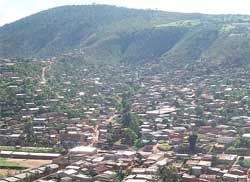
Top stories




But in a region long associated with war and genocide, Rwanda is busy trying to reinvent itself as a regional high technology hub by rolling out free citywide and eventually nationwide wireless connectivity.
"I came to use the Internet. Sometimes I download videos and books," said South Korean development worker Lee Il-mo, aged 31 and a resident of the Rwandan capital Kigali for the past two years.
"Before I went to restaurants or coffee bars and I had to buy a drink, but here it's a free area," he said, sitting in Kigali City Tower -- a zone slated as the city's new technology hub and the one of the first steps of the so-called 'Smart Kigali' project.
Last month the Rwandan government announced it had started to cover the lush green, rolling hills of the capital with wireless hotspots.
This was the first step in a plan to provide WiFi coverage to all schools and public buildings, markets, bus stations and hotels in the city and, in the long-term, to the entire country.
Rwanda's minister in charge of Information Technology, Jean Philibert Nsengimana, said he wanted to see the plan accelerate growth of the Internet sector and attract more investors.
"Connectivity is one of the most important draws for business in this age of digital economy," he said, asserting that free WiFi was merely a step in the direction of a much bigger infrastructure goal - that of fourth generation, or 4G, access.
In June, the Rwandan government signed South Korea's KT Corp to build a 4G network that it wants delivered to 95% of the country, up from the estimated 10% who currently have 3G access.
"Broadband access," said Nsengimana, "has to be considered as an essential, just like water and electricity." For Rwanda's government, the stakes are high.
President Paul Kagame and his ruling Rwandan Patriotic Front (RPF), which has dominated Rwanda since ousting Hutu extremists and ending the genocide nearly 20 years ago, is attempting to push through a dramatic transformation from trauma to economic success story.
The country is ranked as one of the least corrupt countries in Africa, while the World Bank's ease of doing business index for 2013 ranked Rwanda 52nd out of 185 countries, the third best in sub-Saharan Africa.

But the government now wants to push economic growth to 11.5% for each of the next five years, drive poverty from 45% to below the 30% mark and reach middle-income status by 2020 -- no easy task for a mainly agricultural economy.
And for the 'Smart Kigali' plan to succeed, the private sector needs to stay on board. "Smart Kigali really is a test. It is giving people a taste of better things to come," explained Alex Ntale, director of the Rwanda's information and communications technology chamber.
"But it is not perpetual, someone has to pay at the end of the day. The private companies are testing a business model. They are trying to find out if the market is really there," he said.
He cautioned that if the new, high-technology Rwanda fails to take off and the programme does not turn out to be profitable, then the private sector will have every right to switch off the services
Mark Bohlund, an economist with IHS Global Insight, said he was optimistic Rwanda would develop into a regional business-services centre, at least serving the currently war-torn but mineral rich country east of the Democratic Republic of Congo.
But he also pointed to tough competition from east Africa's largest economy Kenya, which is already ahead on mobile banking technology and home to offices of technology companies such as Intel, Google and Microsoft.
Elettra Pauletto, an analyst at Control Risks, said while Rwanda was scoring well on World Bank rankings because of low levels of corruption and positive attitudes towards foreign investment, it was still had some way to go.
"Rwanda has focused its efforts on improving World Bank scores, but is so far much weaker in its provision of follow-up once a business is set up," she said.
As for the information technology sector, she said it was unlikely to become a major factor in drawing international business interest in the short-term.
"Rwanda will face stiff competition from Kenya and South Africa, both of which are already more experienced in the sector and who have more advanced English language skills compared with Rwanda, who, until recently was primarily a Francophone country," she said.
"Large investments typically require a large labour pool, and Rwanda just doesn't have that available at the moment," she added.
Source: AFP via I-Net Bridge

For more than two decades, I-Net Bridge has been one of South Africa’s preferred electronic providers of innovative solutions, data of the highest calibre, reliable platforms and excellent supporting systems. Our products include workstations, web applications and data feeds packaged with in-depth news and powerful analytical tools empowering clients to make meaningful decisions.
We pride ourselves on our wide variety of in-house skills, encompassing multiple platforms and applications. These skills enable us to not only function as a first class facility, but also design, implement and support all our client needs at a level that confirms I-Net Bridge a leader in its field.
Go to: http://www.inet.co.za